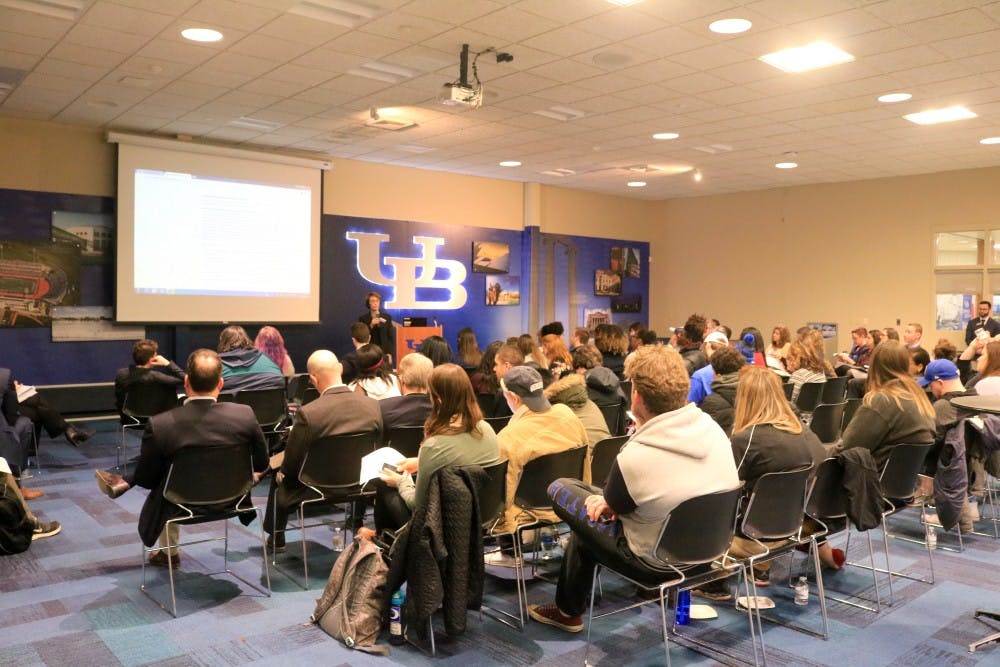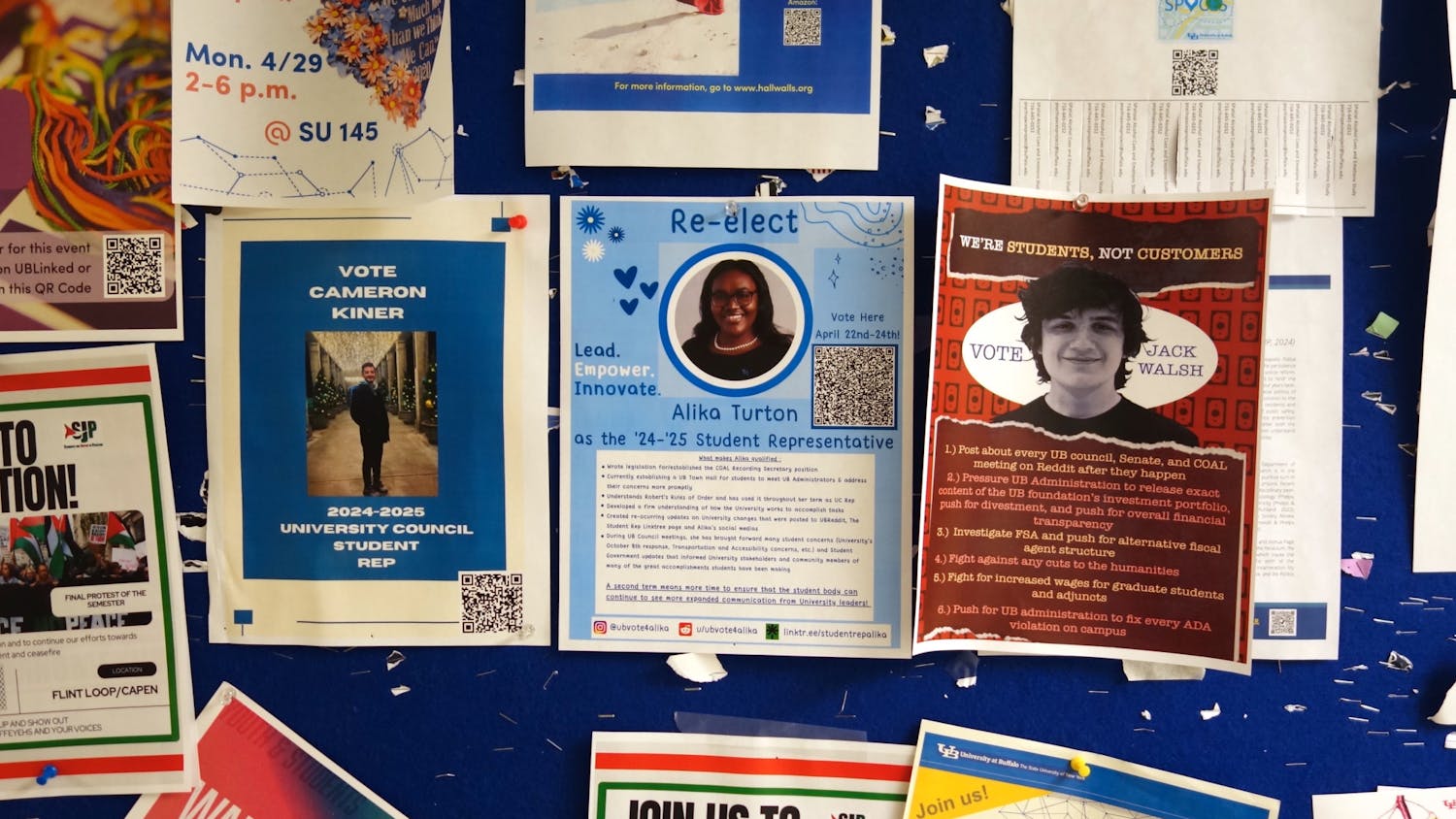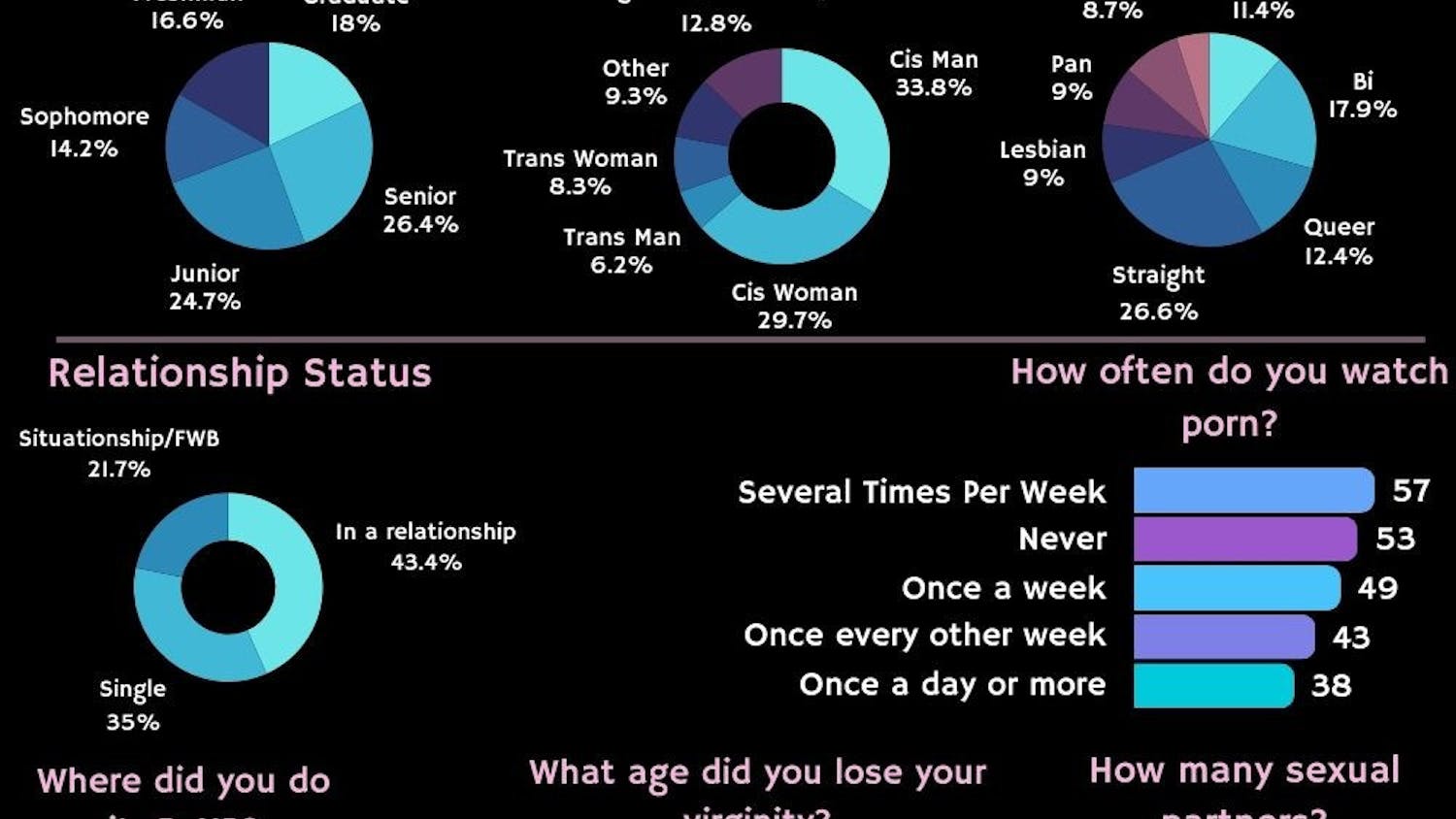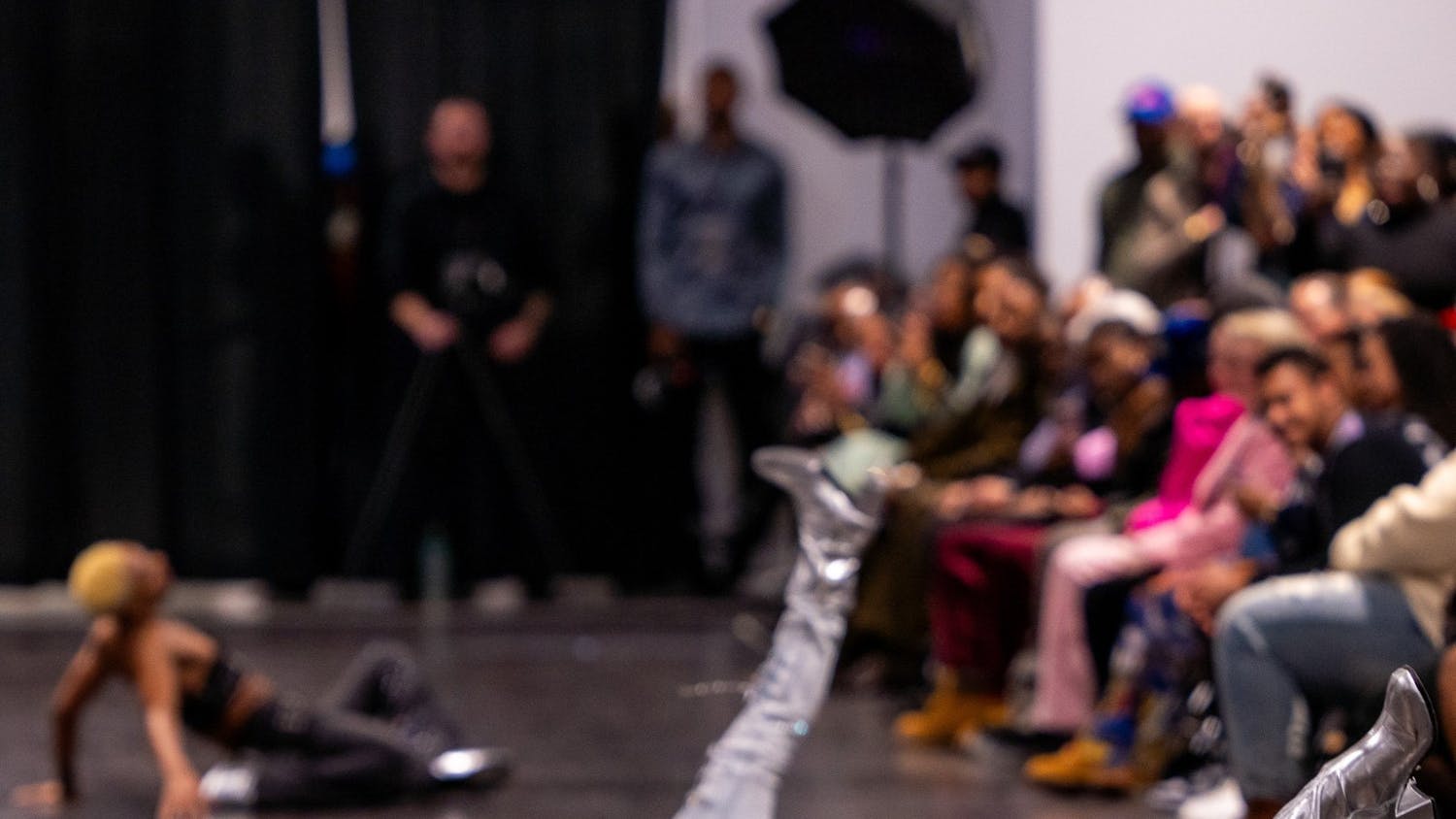An open forum on broad-based fee increases marked a visibly tense two and a half hours of back and forth between students and administrators on Thursday. This was the first chance for students to meet in person with fee stewards before the March 7 deadline to send proposals to SUNY.
The Office of the Provost first announced its plan for a five-year 2.53 percent comprehensive fee increase in an email to the student body Feb. 9. Students were informed about the question and answer with fee stewards on Feb. 12, three days before the meeting.
Eleven fee stewards from eight comprehensive fee departments presented on their department’s spending from last year. They also discussed their proposals for the future fee increases and fielded questions from roughly 45 students who attended the Feb. 15 meeting in 210 Student Union.
Campus Life
Campus Life Director Tom Tiberi and Mara Huber, associate dean of undergraduate education and experiential learning, discussed Campus Life expenditures, which last year totaled $5,362,600. Tiberi and Huber proposed a $10 increase in 2018-19 to cover inflationary increases and increases in minimum wage. Graduate Student Association President Tanja Aho asked if the departments, including Campus Life, would explain how their fees benefit graduate students.
Tiberi responded that it is difficult to tell who attends or benefits from specific programs because not all events can be tracked easily through systems like card swipes. Huber, the director of the Experiential Learning Network, formerly The Academies, said she is working to help graduate students utilize ELN’s services. Aho said the most important experiential learning for grad students are conferences, which she said they do not currently receive any money from the university to attend.
“We don’t need another office to organize that for us,” Aho said. “We would actually need that money ourselves. The university is not giving us a single cent to do that. That’s the most important experiential learning that we need.”
Aho added that this is the second year she’s advocated for research funding and expressed frustration that student input at fee consultations doesn’t appear to be implemented.
Other students expressed concern that the Campus Life expenditures online were confusing and lacking specific information on expenditures. Tiberi said he would look into getting more detailed expenditures on the website.
Athletics Fee
Nate Wills, senior associate athletics director, discussed the Athletics fee spending last year, which totaled $8,982,000. The largest portion of the money went toward student employment, followed by grants-in-aid for women to help UB comply with Title IX requirements and the operational costs for men’s and women’s sports, Wills said. Wills proposed a two percent increase for the next five years to cover inflationary costs and increases in minimum wage.
Anyssa Evelyn, a junior health and human services major, asked why the student fees went toward paying for tutors for the student-athletes.
Wills responded that the money doesn’t actually go toward the students' tutoring services, but to the wages for the student employed to tutor the student-athlete. Still, Wills admitted it was effectively the same thing as paying for the athlete’s tutor.
Several students expressed frustration that they pay almost $9 million toward a program that directly benefits roughly 400 students.
Aho asked Wills to clarify if the money spent on grants for women was to meet Title IX compliance.
“Well [it’s] to assist with it, it’s one way of helping us comply,” Wills said.
Aho pointed out the website’s infographic said the fee goes toward over 70 percent of female athletes.
“Yeah, I mean, we’re trying,” Wills responded.
College and Academic Excellence and Success Fee
Laura Barnum, associate vice president for Resource Planning and Ashley Kravitz, resource analyst for Resource Planning presented on the College Fee and Academic Excellence and Success Fee, which will increase by $100 next year. Barnum explained the history behind the Academic Excellence and Success Fee, which has been largely unpopular among students since its announcement in 2011.
In the midst of national decline in higher education funding, UB joined four other university centers in the SUNY system in implementing the Academic
Excellence and Success Fee to compete with other prestigious research universities nationwide, Barnum said.
The proposed increase will be used to recruit faculty and make classroom enhancements for students, according to Barnum. Provost Charles Zukoski oversees the fee allocation proposals, which are then sent to SUNY for approval.
During Barnum’s presentation, The Spectrum’s Editor-in-Chief Hannah Stein formally requested The Spectrum be added to the Academic Excellence and Success Fee.
Barnum responded that she did not know the answer, but said she would follow up on the question after the discussion.
One student asked if it would be possible to make it more clear to students what this fee goes toward.
Barnum responded that she wasn’t sure what that would look like, but would try to implement something to clarify on the bill or website.
Health
Sharon Mitchell, senior director of counseling and Health & Wellness and Susan Snyder, director of Health Services, proposed a $10 increase for next year, an uncontroversial announcement to a student body that reacted positively. The majority of the increase would go toward fringe benefits and personnel, in addition to supporting two new health service initiatives focused on preventative health care and building resilience in students, according to Mitchell.
SA President Leslie Veloz advocated for increasing the health fee to hire more personnel. She said she has never come across a student against this fee.
Aho echoed Veloz’s statement, urging Health Services to continue to put resources towards personnel to support the mental health needs of students.
Gunnar Haberl, a junior legal studies and political science major, said he was concerned to hear the health fee does not receive any university funding.
“If that needs to be a push by administration to contact New York State elected officials to get more funding for Health and Wellness here on campus, then that’s something that needs to be brought up to our administration, to advocate for things like that,” Haberl said. “That really surprised me. We see the mental health issues taking place and knowing that it’s solely our fee contributed to that, that surprised me.”
Recreation
Wilson Bautista, associate director for informal recreation, stepped in for his supervisor, Sharon Sanford, associate athletic director for recreation and sport management, who was out sick. Bautista said the department is asking for a 1 percent increase to keep up with minimum wage. Recreation spent $785,300 last year.
Veloz also expressed support for an increased recreation fee to provide better facilities for students.
Technology
IT Services Director Chris Clune and Associate University Librarian for Discovery and Delivery Charles Lyons, proposed an increase to cover inflationary costs. Last year, the department’s budget was $19,976,000.
The technology fee increase is routine to meet contractual software obligations and minimum wage increases, Clune said. The fees would not go toward any new services.
Some students pointed out that IT could do a better job of informing students what programs and software are available to them. Clune said he has received this feedback in previous years and is in the process of redesigning IT’s website to make this information more readily available to students.
Transportation
Parking and Transportation Director Chris Austin presented for the Transportation fee, which spent $10,657,000 last year. Austin proposed a $10 increase for 2018-19 to cover inflation-related operational costs as well as two new proposals: a swipe card system for shuttle buses and a license plate recognition system to help students better locate parking spaces.
There are hundreds of available parking spaces at any given time during the day, so the license plate recognition system is a better use of resources than looking into a parking structure at this time, Austin said.
Austin said the shuttle swipe system was designed to better ensure students are using the shuttles and to get a better idea of where and when students are riding. He said student safety was the number one reason for implementing the shuttle swipe.
When asked, Austin said safety on the shuttles has not been an issue.
Transcript Fee
Kara Saunders presided over the evening’s least confrontational fee: the transcript fee. Last year, the department spent $153,600. Its chief purpose is to provide transcripts to students and alumni. Saunders said her office keeps its costs down in part because many of its student employees have work-study appointments.
Students can send feedback to ubstudentaccounts@buffalo.edu, fill out the online Comprehensive Fee survey in the HUB until Feb. 23.
Sarah Crowley is the senior news editor and can be reached at sarah.crowley@ubspectrum.com.





